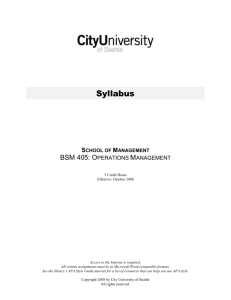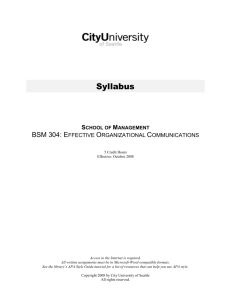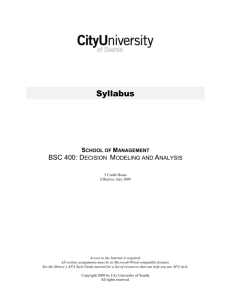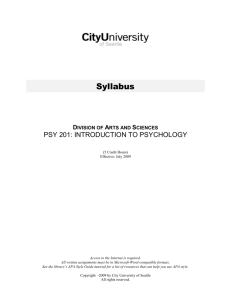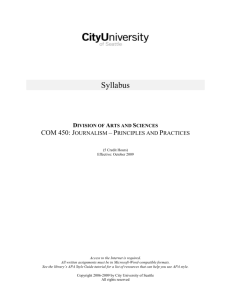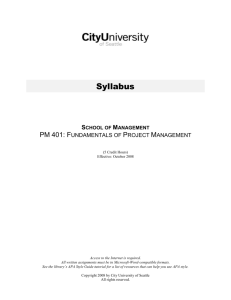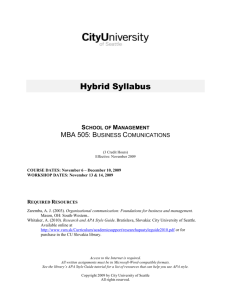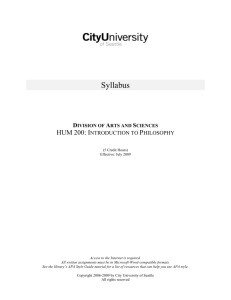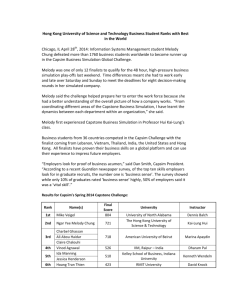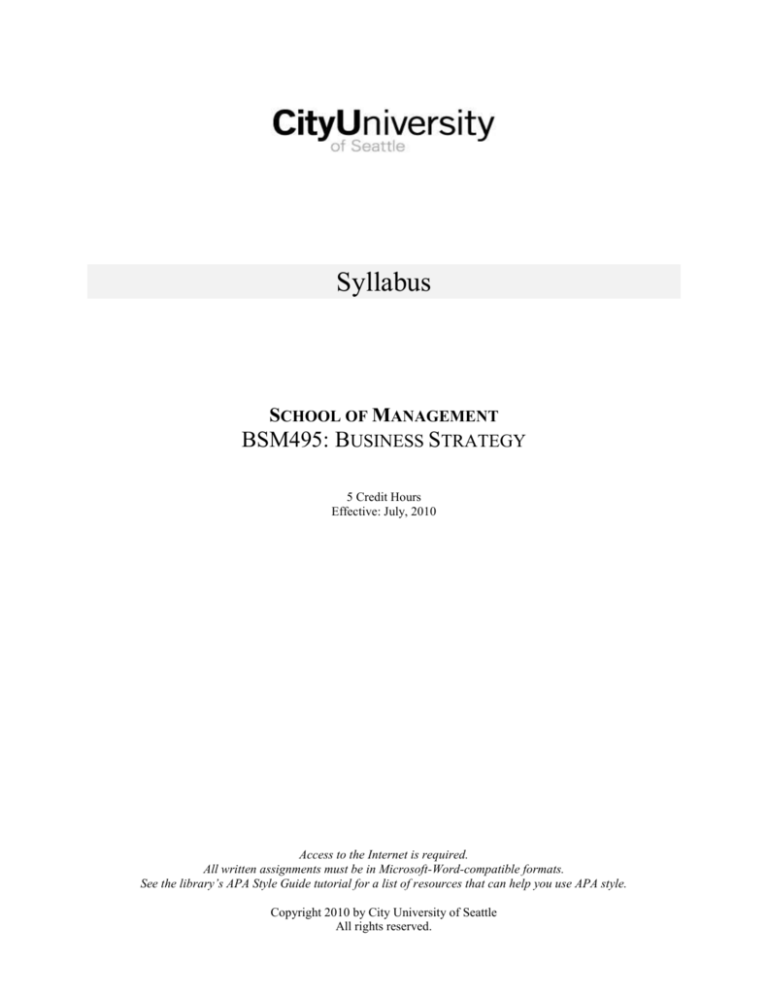
Syllabus
SCHOOL OF MANAGEMENT
BSM495: BUSINESS STRATEGY
5 Credit Hours
Effective: July, 2010
Access to the Internet is required.
All written assignments must be in Microsoft-Word-compatible formats.
See the library’s APA Style Guide tutorial for a list of resources that can help you use APA style.
Copyright 2010 by City University of Seattle
All rights reserved.
BSM495: BUSINESS STRATEGY
FACULTY
Faculty Name:
Contact Information:
[Instructor may insert personal message if desired]
COURSE DESCRIPTION
The objectives of this capstone course are to foster clarity and depth of learning for students at the
culmination of their business education, and to provide a means to measure program learning outcomes.
This course provides the student an opportunity to integrate discrete skills gained from prior coursework
in general business, accounting, marketing, management, business law, communications, operations,
human relations, and information systems. Students address financial, growth and management issues and
problems, viewing them from multiple perspectives. They gain hands-on experience managing a company
in a team environment using a sophisticated business simulation and case studies.
Prerequisite: Prior to enrolling in BSM495, students must be in their last quarter of study. Any exceptions
must have special permission from the BSBA Program Director.
COURSE RESOURCES
Required and recommended resources to complete coursework and assignments are listed on the
My.CityU portal at Library>Resources by Course.
CITYU LEARNING GOALS
The content of this course addresses the following CityU Learning Goals:
Professional Competency and Professional Identity;
Strong Communication and Interpersonal Skills;
Critical Thinking;
Commitment to Ethical Practice and Service;
Diverse and Global Perspectives;
Lifelong Learning.
PROGRAM CONTEXT
BSM495 is the final Capstone course in the Business Administration and Accounting programs. It is
designed to bring together the knowledge gained through the entire business program and permit students
to demonstrate competency in the various program outcomes. Students are expected to apply and
integrate a variety of skills, tools, knowledge, and critical thinking to assess the strategic business issues
in a real-world business scenario.
BSM 495
Page 2
Eff: 07/10
COURSE OUTCOMES
In this course, learners will:
Evaluate a company’s strategy, its business position, and how it can gain a sustainable
competitive advantage;
Examine the impact of the external environment (industry and macro-environment) on executive
decision-making.
Exhibit the ability to lead, make decisions, and function as an effective member of an executive
management team;
Communicate business planning, concepts, and processes;
Appraise the importance of ethical principles, personal and company values, and socially
responsible leadership and management practices;
Develop critical thinking and problem-solving skills for identifying business issues and making
decisions for organizations in a rapidly changing domestic and global business environment;
Craft business strategy, reasoning carefully about strategic options, using what-if analysis to
evaluate action alternatives, and initiating the changes necessary to keep the strategy responsive
to global and emerging market conditions;
Synthesize learning from emphasis area classes.
CORE CONCEPTS, KNOWLEDGE, AND SKILLS
1.
2.
3.
4.
5.
6.
7.
8.
9.
10.
11.
12.
13.
14.
15.
16.
17.
18.
19.
20.
21.
22.
23.
24.
25.
26.
27.
Strategic alignment
Ballanced Scorecard
Budgeting
Change management
Communication
Comptentencies
Competitive advantage
Corporate strategy
Organizational structure
Customer management
Differentiation
Financial measures
Siloing
Government regulation
Human resources
Insentive compensation
Initiatives
Internal business processes
Knowledge management
Motivation
Operations
Organizational learning
Planning
Reporting
Resource allocation
Strategic mapping
Synergy
BSM 495
Page 3
Eff: 07/10
28. Total quality management
29. Value creation
30. Vision
OVERVIEW OF COURSE GRADING
The grades earned for the course will be derived using City University of Seattle’s decimal grading
system, based on the following:
Overview of Required Assignments
% of Final Grade
Emphasis Area Assessment
International Case Analysis
Team Charter and Peer Evaluation
CAPSIM Foundation Business
Simulation
CAPSIM Team Decision-Making
Report
CAPSIM Comp-XM Exam
Instructor Determined Assignments
(Including Participation and
Discussion)
10%
10%
5%
25%
TOTAL
100%
10%
20%
20%
SPECIFICS OF COURSE ASSIGNMENTS
Your instructor will provide grading rubrics that will provide more detail as to how these assignments
will be graded.
Emphasis Area Assessment
The purpose of the emphasis area assessment is to determine whether you have integrated the concepts,
knowledge and skills learned in the emphasis area courses taken previously. Each emphasis area may be
assessed in a different manner, using case studies, short answer essays or complex standardized
examination. Your instructor will assign you the assessment related to your particular emphasis area or
major and will provide the grading criteria.
International Case Analysis Assignment
The purpose of a case analysis assignment is to provide you with an opportunity to apply concepts from
class to real-world situations. The case analysis should be brief and concise, no more than four to ten
pages, double spaced, plus a title page and a reference page. Please be sure to incorporate theories or
concepts from class or other readings and reference them appropriately.Your instructor will assign you a
case study drawn from the international arena.
Components
% of Grade
Clear explanation of key strategic issues
Valid arguments; analysis of financial performance with relevant
supportive detail
BSM 495
Page 4
Eff: 07/10
20%
20%
Appropriate analysis, evaluation, synthesis for the specific
industry identified
Conclusions and recommendations are congruent with strategic
analysis
20%
Proper organization, professional writing, and logical flow of
analysis. APA formatting
20%
TOTAL
100%
20%
Team Charter and Peer Evaluation
You will work in a team to manage a company in the CAPSIM business simulation. With your
teammates, you will create a team charter that delineates the duties of each member of the team, and then
evaluate the functioning of the team and contributions of each member. You will submit a peer evaluation
on the members of your team. You will also evaluate your individual performance as a team member.
You will rank team members on participation, presentation, and contribution to the learning experience.
All grades and comments will be kept strictly confidential. Obviously biased grades will not be used; this
is not a personality measure. The evaluation should be typed and contain detailed information about the
team member’s contributions. You should take this requirement seriously and give thought to the final
rankings because identical grades on group assignments are not a given outcome. In other words,
evaluations which give everyone an A, without detailed explanation, and those hurriedly completed the
final night of class are worthless.
You will use the team charter and peer evaluation forms to submit your assignment, which will be
distributed to you by your instructor.
CAPSIM Foundation Business Simulation
Capsim Foundation Business Simulation: This assignment requires your participation in Foundation
Business Simulation - a strategic management simulation - as a team. Students will work as a team; there
will be other student and computer-generated teams that your team will be competing against. Foundation
simulations offer students the opportunity to come as close as possible to managing a real company and
thereby develop an understanding of the challenges encountered when managing a business.
The simulation provides students with the opportunity to gain hands-on experience in running a business
as a member of a senior management team. Management teams are required to evaluate situations and
make decisions, evaluate outcomes, and compete with other management teams for resources,
opportunities, and markets. Your team will have the opportunity to set corporate strategies, and apply
strategic concepts and techniques within a practical decision-making framework. In this way you have the
opportunity to see how a firm's production, marketing, R&D, HR, and financial operations interact and
observe the impact of key decisions on business performance within a competitive market.
Team members will assume the role of the top management team of one of the companies in the industry.
Over the five-year timeframe of the simulation, your team will encounter a range of strategic issues that
will force you to integrate your knowledge of accounting, finance, marketing, operations, and strategic
management.
BSM 495
Page 5
Eff: 07/10
Complete details of the simulation are included in the Team Member Guide and online at Capsim.com.
Your grade for Capstone will be based on two criteria: (1) your team's performance in the simulation
based on the Balanced Scorecard, (2) and how well the team met the performance objectives set by the
team.
Components
% of Grade
Performance on Balanced Scorecard
Attainment of performance objectives set by team
50%
50%
TOTAL
100%
CAPISM Team Decision-Making Report
BSM495 requires that participants work on teams. These teams simulate the challenges faced by real life
executive leadership teams in defining problems and making decisions. Effective team performance is
often critical to business success and bottom line results.
The program involves practicing high level executive decision-making as a member of a management
leadership team. As a team member, you will have the opportunity to rationally evaluate errors of
judgment and make corrections. Individual effort and contribution in the team meetings and assignments
will be a consideration when determining an individual’s final grade.
The team paper should summarize the company’s management decisions and final results in relation to
the competitive strategy and implementation plan.
The team should indicate how their decisions supported the strategic objectives. They should analyze
performance results from years 1 - 5 and evaluate the competitive strategy’s progress in regard to
achieving forecasted results.
Components
% of Grade
The team established a clear, concise, and measurable set of goals
to reach strategic objectives.
Team analysis of each round's results with adjustments made to
decisions in response to competitors' actions.
Integration of course concepts to aid in the decision making
process.
Conclusions and recommendations are congruent with strategic
analysis
20%
Proper organization, professional writing, and logical flow of
analysis. APA formatting
20%
TOTAL
100%
20%
20%
20%
CAPSIM Comp-XM Exam
Comp-XM tests each student's individual learning. The basis for Comp-XM is a modified version of the
Foundation Business Simulation. Each student takes a test that reflects his or her unique decisions in
Foundation.
BSM 495
Page 6
Eff: 07/10
The CAPSIM Comp-XM exam is an assessment tool designed to allow students to demonstrate how well
they understand business. Comp-XM assesses each student’s understanding of business. Students
individually operate a Foundation business simulation company - then the "board of directors" asks the
student a series of questions about their company’s results. Grading is assessed in two ways: 1.) The first
is how well a student operated the simulated company; a balanced scorecard is used to assess
performance. 2.) The second is how well a student did on a series of questions given by the “board of
directors” about the company’s results. It takes about five to six hours to complete the exam.
The Comp-XM Exam will be made available in Session 7 of the course. Students will be able to access
the Comp-XM Web site to download the student guide and review the introductory tutorials and practice
sessions for the exam.
The Comp-XM exam consists of four Foundation Simulation rounds and a series of questions posed by
the Board of Directors after each round. It takes approximately one hour to complete each round. The
final phase of the exam is a series of questions posed by the Board of Directors concerning the final
results your company achieved in the Simulation. It takes approximately one hour to complete the
Board’s final review.
The Final Exam portion of Comp-XM Exam will be made available at the beginning of Session ten and
close at the end of the course in Session ten.
Components
% of Grade
Performance on Balanced Scorecard
100%
TOTAL
100%
COURSE POLICIES
This document provides an overview of the course foundation elements, assignments, schedules, and
activities. For information about general, City University of Seattle policies, please see the City
University of Seattle catalog. If you have additional questions about the course, please contact your
instructor.
Late Assignments
Students are expected to meet submission requirements for assignments in a timely manner. Evaluation
includes an assessment of timeliness. Late assignments jeopardize your learning, and may also penalize
your classmates as most assignments will not be returned to students until all students have submitted
their work. Late submission of assignments may be penalized up to 50% of the grade per late week. Your
instructor will provide additional details.
Quizzes, exams, and comprehensive assessments must be taken at the scheduled times. Any absences or
late submissions must be approved before the scheduled assessment date, by your instructor. Not
completing a quiz, exam, or comprehensive assessment in a timely manner will result in a grade of zero
unless a student has been preapproved by the instructor to complete the assessment at an alternative time.
BSM 495
Page 7
Eff: 07/10
Participation
Whether in class, online, or in a mixed mode setting, students will be graded on their participation in
classroom discussions; their ability to present, explain, or defend alternative viewpoints; and the degree to
which they have mastered the concepts and principles inherent in the study of Strategic Management.
Written work will be assessed not only on relevance to the subject presented, but also on adherence to
good written form and professional presentation.
Students are expected to be actively engaged in a discussion or other activities. Active engagement
means contributing substantive, thoughtful and reflective responses. For online classes, students must post
their initial responses during the first three days of the week, and their responses to other students’
postings during the last four days of the week.
Professional Writing
Assignments require error-free writing that uses standard English conventions and logical flow of
organization to address topics clearly, completely, and concisely. CityU requires the use of APA style.
UNIVERSITY POLICIES
You are responsible for understanding and adhering to all of City University of Seattle’s academic
policies. The most current versions of these policies can be found in the University Catalog that is linked
from the CityU Web site.
Scholastic Honesty
Scholastic honesty in students requires the pursuit of scholarly activity that is free from fraud, deception
and unauthorized collaboration with other individuals. You are responsible for understanding CityU’s
policy on scholastic honesty and adhering to its standards in meeting all course requirements. A complete
copy of this policy can be found in the University Catalog in the section titled Scholastic Honesty under
Student Rights & Responsibilities.
Attendance
Students taking courses in any format at the University are expected to be diligent in their studies and to
attend class regularly.
Regular class attendance is important in achieving learning outcomes in the course and may be a valid
consideration in determining the final grade. For classes where a physical presence is required, a student
has attended if s/he is present at any time during the class session. For online classes, a student has
attended if s/he has posted or submitted an assignment. A complete copy of this policy can be found in
the University Catalog in the section titled Attendance Policy for Mixed Mode, Online and
Correspondence Courses.
SUPPORT SERVICES
Disability Resources
If you are a student with a disability and you require an accommodation, please contact the Disability
Resource Office as soon as possible. For additional information, please see the section in the University
Catalog titled Students with Special Needs under Student Rights & Responsibilities.
BSM 495
Page 8
Eff: 07/10
Library Services
In order to help you succeed in this course, you have access to library services and resources 24 hours a
day, seven days a week. CityU librarians can help you formulate search strategies and locate materials
that are relevant to your coursework. For help, contact a CityU librarian through the Ask a Librarian
service. To find library resources, click on the Library link in the My.CityU portal.
Smarthinking
As a CityU student, you have access to 10 free hours of online tutoring offered through Smarthinking,
including writing support, from certified tutors 24 hours a day, seven days a week. Contact CityU’s
Student Support Center at info@cityu.edu to request your user name and password.
BSM 495
Page 9
Eff: 07/10

